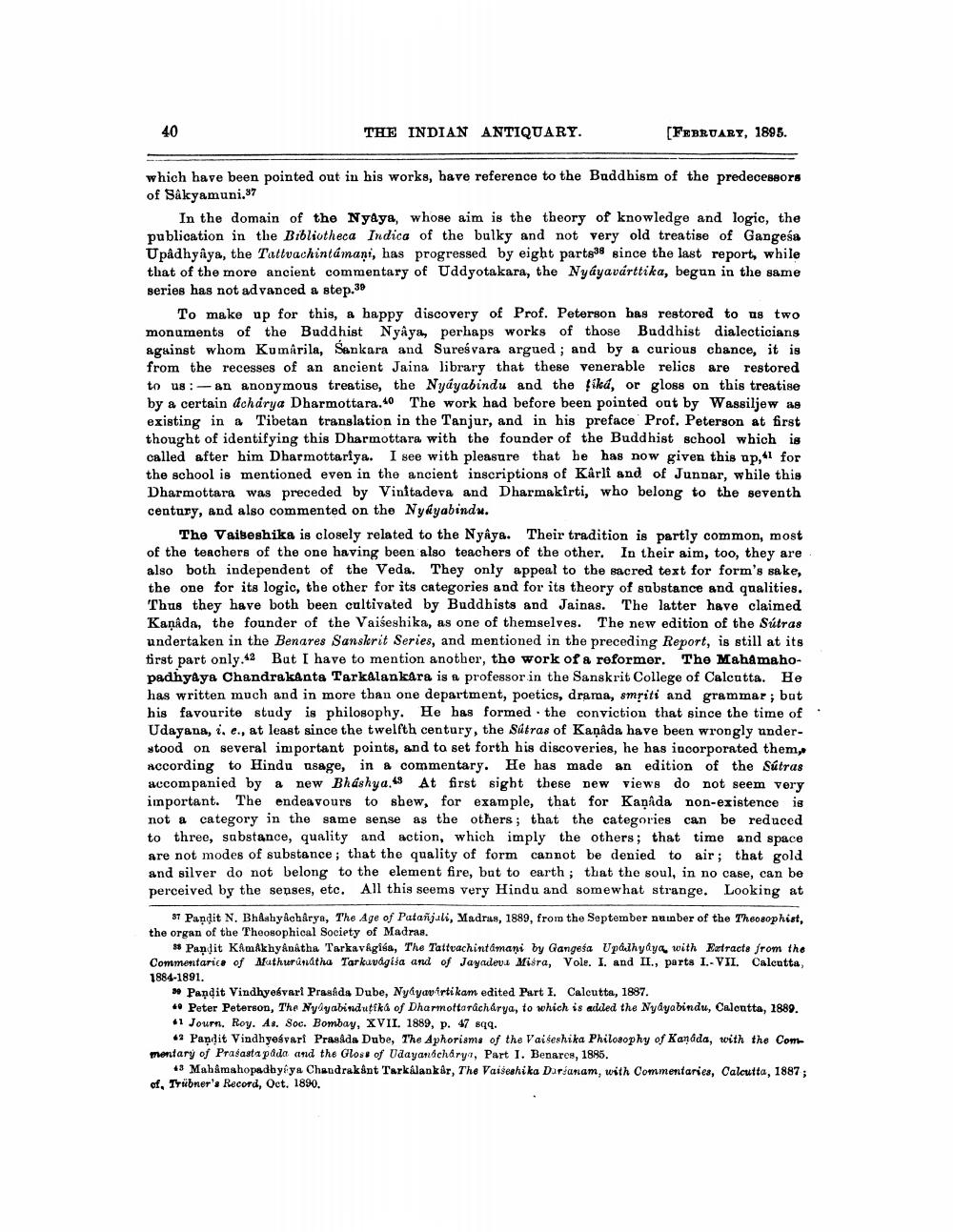________________
THE INDIAN ANTIQUARY.
[FEBRUARY, 1895.
which have been pointed out in his works, have reference to the Buddhism of the predecessors of Sakyamuni.37
In the domain of the Nyaya, whose aim is the theory of knowledge and logic, the publication in the Bibliotheca Indica of the bulky and not very old treatise of Gangesa Upådhyâya, the Tattvachintamani, has progressed by eight parts38 since the last report, while that of the more ancient commentary of Uddyotakara, the Nyáyavárttika, began in the same series has not advanced a step.30
To make up for this, a happy discovery of Prof. Peterson has restored to as two monuments of the Buddhist Nyâya, perhaps works of those Buddhist dialecticians against whom Kumârila, Sankara and Sureśvara argued ; and by a curious chance, it is from the recesses of an ancient Jaina library that these venerable relics are restored to us : - an anonymous treatise, the Nyáyabindu and the fiká, or gloss on this treatise by a certain Acharya Dharmottara.40 The work had before been pointed out by Wassiljew ag existing in & Tibetan translation in the Tanjur, and in his preface Prof. Peterson at first thought of identifying this Dharmottara with the founder of the Buddhist school which is called after him Dharmottariya. I see with pleasure that he has now given this up, 1 for the school is mentioned even in the ancient inscriptions of Karli and of Junnar, while this Dharmottara was preceded by Vinitadeva and Dharmakirti, who belong to the seventh century, and also commented on the Nykyabindu.
The Vaibeshika is closely related to the Nyây&. Their tradition is partly common, most of the teachers of the one having been also teachers of the other. In their aim, too, they are also both independent of the Veda. They only appeal to the sacred text for form's sake, the one for its logic, the other for its categories and for its theory of substance and qualities. Thus they have both been cultivated by Buddhists and Jainas. The latter have claimed Kanada, the founder of the Vaišeshika, as one of themselves. The new edition of the Sútras undertaken in the Benares Sanskrit Series, and mentioned in the preceding Report, is still at its first part only.s2 But I have to mention another, the work of a reformer. The Mahamahopadhyâya Chandrakanta Tarkalankára is a professor in the Sanskrit College of Calcutta. He has written much and in more than one department, poetics, drama, smriti and grammar; but his favourite study is philosophy. He has formed the conviction that since the time of Udayana, i, e., at least since the twelfth century, the Sutras of Kaņâda have been wrongly understood on several important points, and to set forth his discoveries, he has incorporated them, according to Hindu usage, in a commentary. He has made an edition of the Sútras accompanied by a new Bhashya. At first sight these new views do not seem very important. The endeavours to shew, for example, that for Kanada non-existence is not a category in the same sense as the others; that the categories can be reduced to three, sabstance, quality and action, which imply the others; that time and space are not modes of substance; that the quality of form cannot be denied to air; that gold and silver do not belong to the element fire, but to earth; that the soul, in no case, can be perceived by the senses, etc. All this seems very Hindu and somewhat strange. Looking at
37 Pandit N. BhAshyacharya, The Age of Patañjali, Madres, 1889, from the September number of the Theosophist, the organ of the Theosophical Society of Madras.
5Pandit KamAkhyánátha Tarkavågisa, The Tattvachintamani by Gangesa Upadhyaya, with Extracts from the Commentarice of Muthurunatha Tarkuvägiša and of Jayadevu Misra, Vole. I and II., parts I. VII. Calcutta, 1884-1891.
» Pandit Vindhyesvari Prasada Dube, Nyayavirti kam edited Part I. Calcutta, 1887. 4. Peter Peterson, The Nylyabinduţiká of Dharmottarůcharya, to which is added the Nyayabindu, Calcutta, 1889. 41 Journ. Roy. As. Soc. Bombay, XVII. 1889, p. 47 sqq.
*2 Pandit Vindhyesvari Prasada Dube, The Aphorisms of the Vaiseshika Philosophy of Kanada, with the Com mentary of Prasasta pada and the Gloss of Udayandcharya, Part I. Benares, 1886.
43 Mah&mahopadbyiya Chandrakant TarkAlankar, The Vaiseshika Durianam, with Commentaries, Calcutta, 1887; of, TTübner's Record, Oct. 1890.




